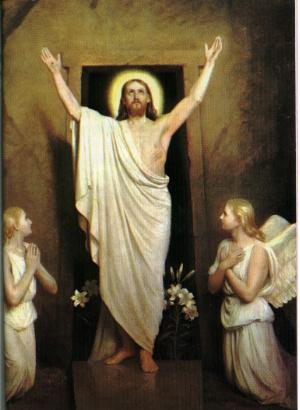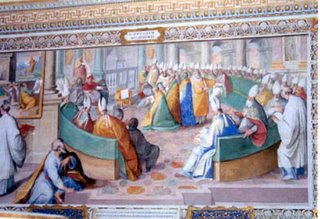LUTHER 1527 The Council of Nicaea, 325.


LUTHER 1527
The metaphor is quickly taken away from him in Paul and Moses, because Paul says, “They drank from the spiritual rock, and the Rock was Christ” [I Cor. 10:4]. Here St. Paul himself shows that he speaks of a spiritual rock. Now the spiritual rock does not represent Christ, but the rock was Christ himself among the Jews, just as our rock now does not represent but is nothing else but Christ. -Martin Luther The Council of Nicaea, 325.
….in this, as in every other of the Seven Ecumenical Councils, the question the Fathers considered was not what they supposed Holy Scripture might mean, nor what they, from a priori arguments, thought would be consistent with the mind of God, but something entirely different, to wit, what they had received. They understood their position to be that of witnesses, not that of exegetes. They recognized but one duty resting upon them in this respect - to hand down to other faithful men that good thing the Church had received according to the command of God. The first requirement was not learning, but honesty. The question they were called upon to answer was not, What do I think probable, or even certain, from Holy Scripture? but, What have I been taught, what has been intrusted to me to hand down to others? When the time came, in the Fourth Council, to examine the Tome of Pope St. Leo, the question was not whether it could be proved to the satisfaction of the assembled fathers from Holy Scripture, but whether it was the traditional faith of the Church. It was not the doctrine of Leo in the fifth century, but the doctrine of Peter in the first, and of the Church since then, that they desired to believe and to teach, and so, when they studied the Tome, they cried out:
“This is the faith of the Fathers! This is the faith of the Apostles!...Peter hath thus spoken by Leo! The Apostles thus taught! Cyril thus taught!” etc.
NICENE AND POST-NICENE FATHERS (Second Series) VOLUME 14 The Seven Ecumenical Councils
….in this, as in every other of the Seven Ecumenical Councils, the question the Fathers considered was not what they supposed Holy Scripture might mean, nor what they, from a priori arguments, thought would be consistent with the mind of God, but something entirely different, to wit, what they had received. They understood their position to be that of witnesses, not that of exegetes. They recognized but one duty resting upon them in this respect - to hand down to other faithful men that good thing the Church had received according to the command of God. The first requirement was not learning, but honesty. The question they were called upon to answer was not, What do I think probable, or even certain, from Holy Scripture? but, What have I been taught, what has been intrusted to me to hand down to others? When the time came, in the Fourth Council, to examine the Tome of Pope St. Leo, the question was not whether it could be proved to the satisfaction of the assembled fathers from Holy Scripture, but whether it was the traditional faith of the Church. It was not the doctrine of Leo in the fifth century, but the doctrine of Peter in the first, and of the Church since then, that they desired to believe and to teach, and so, when they studied the Tome, they cried out:
“This is the faith of the Fathers! This is the faith of the Apostles!...Peter hath thus spoken by Leo! The Apostles thus taught! Cyril thus taught!” etc.
NICENE AND POST-NICENE FATHERS (Second Series) VOLUME 14 The Seven Ecumenical Councils
HISTORICAL INTRODUCTION (page 2)

0 Comments:
Post a Comment
<< Home